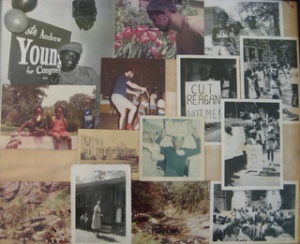Launched in January 2009, the Peoplestown Project is devoted to studying and interpreting the history and evolution of the Peoplestown neighborhood in downtown Atlanta. The project is particularly focused on documenting community empowerment and the role of residents and community-based organizations in the development of grassroots social movements and the strengthening of democracy and civic life.
New website to go live in May 2011
The Peoplestown Project’s website will soon be a reality! I’m loading content, including oral histories, pictures, and manuscript sources. Where will it be? Point your browser to:
Until the site is open to the public, it will be password protected.
See you soon at the new website!
How many green stamps does it take to buy a bus?
In her 2009 interview with me, Sister Marie (Mimi Bodell) recalled how supporters would scrape together resources for Emmaus House in the 1970s:
And Ginny Tuttle—her father was Judge Tuttle in Atlanta—was a volunteer who collected 3,000 books of green stamps so we could buy a bus. We bought one of those big Bluebird yellow new buses. One of the first trips the bus took was to Reidsville Prison. Austin [Ford] and Roche Heriot took turns taking the 12 hour round trip journey once a month.
We were just singing hymns
I owe Dennis Goldstein a list of people The Peoplestown Project has interviewed, and the names we’ve received as suggested interviews, so I thought this would be a good time to tell the history of the project itself. Then I can let everyone know where we’re at now.
The Peoplestown Project launched in December 2008 as a long-term endeavor to document and interpret the Peoplestown neighborhood’s history of community development and neighborhood organizing. We seek organizational records, photographs, personal accounts, and other historical documents that will help preserve and tell the history of neighborhood empowerment and the organizing traditions of the area. In our oral histories, we ask people questions like:
- What inspired you to join the city’s first welfare rights organization?
- Why did you decide to go on strike against your landlord?
- Tell me about delivering surplus food.
- Describe your arrival in Peoplestown. What did you see? What did you think?
- Now you have the property that was to become Emmaus House. What happened next?
- Tell me what you’d do when you went door-to-door.
- When did you hear about the possibility of a new Olympic Stadium?
We are particularly interested in the “storied” experience of Peoplestown and its community-based organizations. We know that stories help bind many people to this place and to each other. Stories are told and re-told, creating a local lore that links people over time and space. We’ve already heard many: the strength and tenacity of a welfare rights leader, vans breaking down at Zesto’s, sleep-ins at the Model Cities offices, singing hymns in the visitor gallery during a General Assembly session. We embrace, collect, and re-circulate those narratives, acknowledging their role in strengthening social networks and sustaining neighborhood life.
The Peoplestown Project also continually works to integrate Peoplestown’s history into public programming, co-curricular activities (like the summer arts program at EH), and the like, so that children, new residents, social service interns, and others will come to know the rich history of Peoplestown and its long-time residents. By preserving the stories of community organizing and neighborhood preservation and development, and by involving area residents in the documentation and interpretive process, we help continue Peoplestown’s history of fostering active citizenship by promoting and facilitating an engaged civic life.
“We were just singing hymns.” Former Emmaus House intern and staff member Ray Quinnelly’s explanation for why she and others were arrested in the visitors’ gallery at a late 1970s Georgia General Assembly session. Quinnelly and others attended the session to protest Governor George Busbee’s broken promise not to change the level of need used to calculate welfare entitlements.
Surplus food
Soon after its founding, Emmaus House launched a program that allowed area residents to take greater advantage of the federal surplus food program. Sister Marie (Mimi Bodell) recalled that Muriel Lokey coordinated the program, and that “eventually she had a hundred women going to the warehouse to pick up surplus food and deliver it to the families.”
Grace Stone explained that “the place where you went to pick it up was off any bus line (on purpose we all felt). They had plenty of boxes, but we had to bring our own boxes or they wouldn’t give us food.” Staff member Dennis Goldstein recalled, “I went over there to see what it was like. You’d go over and go through a line, and there’d be conveyor belt there and essentially you’d pick out, I don’t know, eight to ten food bags that were all marked U.S. Department of Agriculture Surplus Food, and get things like flour and peanut butter and whatever there was a surplus of.” Grace Stone went on, “And the people who handed them out to you were all county prisoners, and the guards sat up on the top of the pile of boxes, with their guns cocked. . . . the guards didn’t really taunt us verbally, but they certainly did in their body language.”
